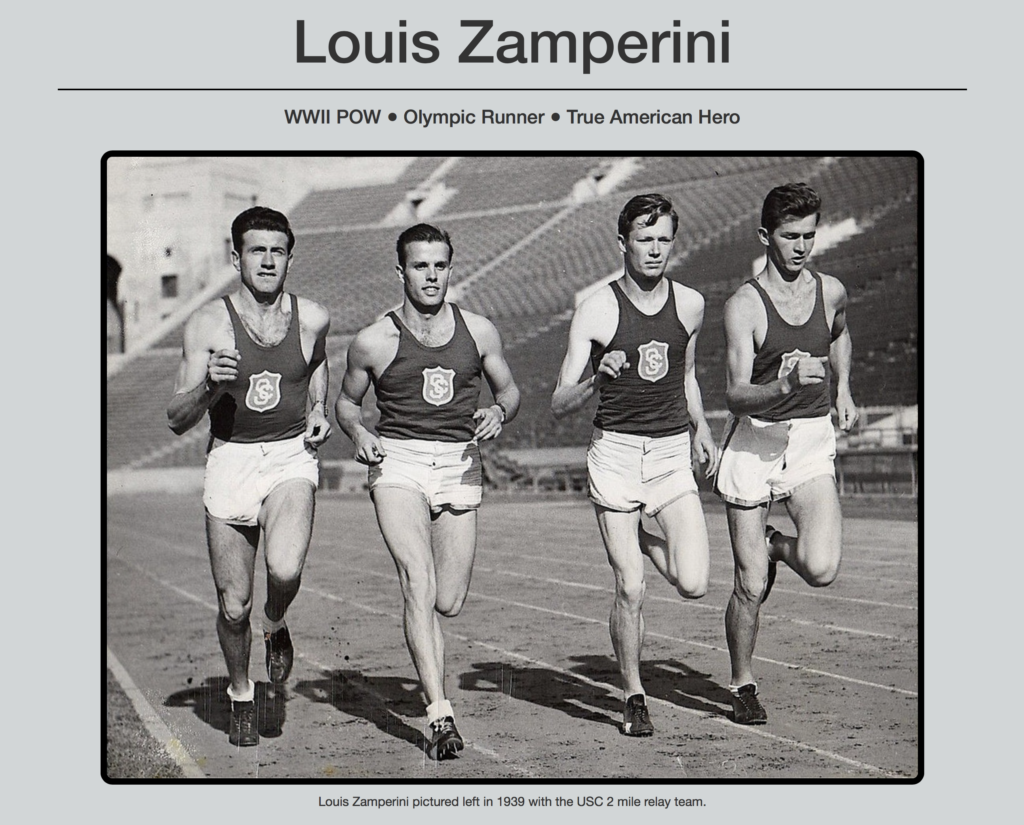Tim Keller, in his book The Meaning of Marriage: Facing the Complexities of Commitment with the Wisdom of God, tells the amazing story of Olympic Runner and World War II hero Louie Zamperini and how both he and his wife came to know Christ – and the dramatic changes that occurred to their (at the time) broken and disintegrating marriage.
Keller makes the point that when we come to know God’s profound love, grace and forgiveness toward us, we are then able to love and forgive others out of “emotional wealth.”
In other words, because “we are loved so deeply [by God]… when someone wrongs us we can afford to be generous, able to forgive.”
Here’s the story (it’s worth taking 2-3 minutes to read)…
“One of the more dramatic examples of this principle [loving out of ‘emotional wealth’] can be found in Laura Hillenbrand’s bestselling biography of World War II hero Louis Zamperini. On a mission over the Pacific in 1943, Zamperini’s plane crashed into the ocean, killing most on board.
After forty-seven days afloat in shark-infested waters, Louie and one other survivor were captured and endured two and a half years of imprisonment, which consisted of almost constant beatings, humiliation, and torture.
Returning after the war, he suffered from severe post-traumatic stress disorder and became an alcoholic. His wife, Cynthia, lost hope for their marriage. Louie spent most of his time dreaming and planning about returning to Japan to murder “the Bird,” a Japanese sergeant who had repeatedly assaulted and tormented him in the camps.
One night he dreamt that the Bird was looming over him. He reached out to defend himself. A scream woke him up and there he was, straddling Cynthia’s chest, his hands locked around the throat of his pregnant wife.
Not long afterward, Cynthia announced to him that she was filing for divorce. He was distressed, but even the threat of losing his wife and child could not stop his drinking or his self-destructive behavior. He was too tormented by his past and his bitterness to change, even to save his family.
Then one day in the fall of 1949, Cynthia Zamperini was told by an acquaintance that there was a young evangelist, Billy Graham, preaching downtown at a special series of tent meetings. She attended and “came home alight.”
She went immediately to Louie and told him she didn’t want a divorce, that she had experienced a spiritual awakening, and that she wanted him to accompany her to hear the preaching. After days of resisting, he finally gave in.
That night, the young preacher’s sermon homed in on the concept of human sin. Louie was indignant. I am a good man, he said to himself. But almost as soon as he had the thought, “he felt the lie in it.” Several nights later he returned and “walked the aisle,” repented, and received Christ as Savior.
Zamperini was immediately delivered of his alcoholism. But more crucially, he felt God’s love flood his life and realized that he was able to forgive all those who had imprisoned and tortured him.
 The shame and sense of powerlessness that had stoked his hate and misery had vanished. His relationship with Cynthia “was renewed and deepened. They were blissful together.”
The shame and sense of powerlessness that had stoked his hate and misery had vanished. His relationship with Cynthia “was renewed and deepened. They were blissful together.”
In October 1950, Louie was able to return to Japan and speak through an interpreter at the prison where many of his former camp guards were now imprisoned. He spoke about the power of Christi’s grace to bring forgiveness, and to the prisoners’ shock, he embraced each of them with a loving smile.
I offer this example with hesitation, because dramatic testimonies of instantaneous change can be misleading. Louis Zamperini’s emotional wounds were unusually deep and so the work of the Spirit – making God’s love in Jesus Christ real to the heart – was also very powerful and dramatic.
God’s Spirit doesn’t always work in such a sudden and obvious way, but he always does this same work. He gave Cynthia hope and Louie release from bitterness, thereby renewing their marriage. He will always have the same influence, whether suddenly or gradually.
(Romans 5:1-2, 5)
Louie Zamperini had been literally tortured, and his inner shame, anger, and fear had eaten up his ability to love and serve others.
But each of us comes to marriage with a disordered inner being. Many of us have sought to overcome self-doubts by giving ourselves to our careers. That will mean we will choose our work over our spouse and family to the detriment of our marriage.
Others of us hope that unending affection and affirmation from a beautiful, brilliant romantic partner will finally make us feel good about ourselves. That turns the relationship into a form of salvation, and no relationship can live up to that.”
(Pages 70-72 – The Meaning of Marriage by Timothy Keller)

Leave a Reply